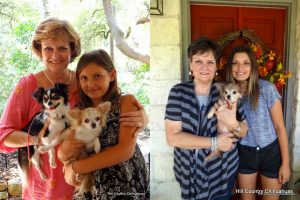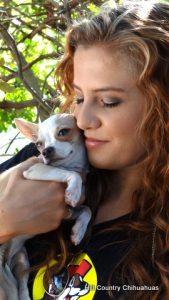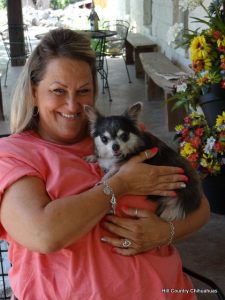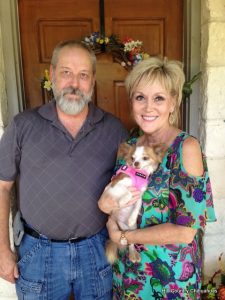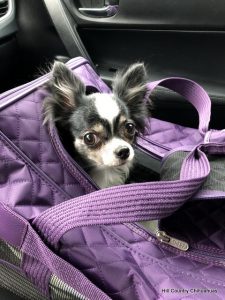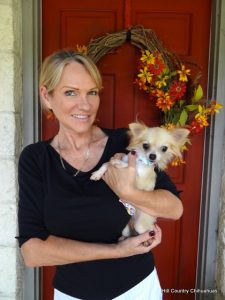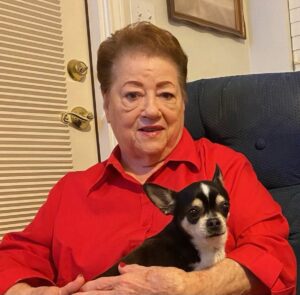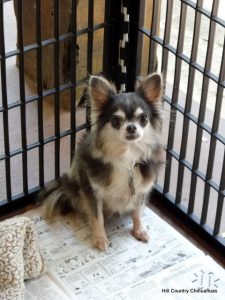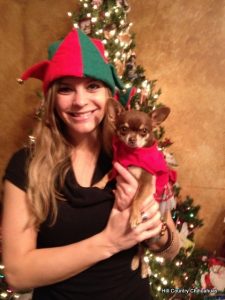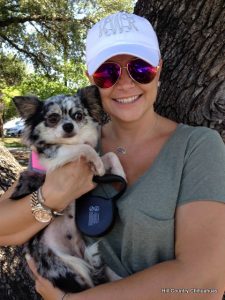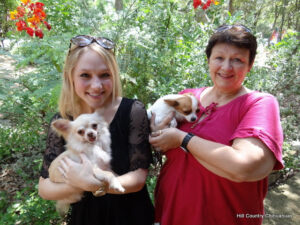There are times we have adult dogs or teenage dogs that are available. Email us to inquire.
August 2024
We have no adult dogs available at this time.
Please, take time to read the below information. The first segment was written by a dear friend and customer who has adopted multiple Chihuahuas from us. Both her and her husband are professionals at making the transition secure and safe for the adult dog. She is patient and allows the dog time to acclimate into their new home and family. Thank you, Dixie, for this wise advice on adopting an adult Chihuahua!
How to Adopt an Adult Chihuahua
The tips provided here are based on experiences and lessons learned in adopting adult Chihuahuas over several years. Some adult Chihuahuas were rescued so we don’t know their history. Two were from Hill Country Chihuahuas so they did have some experiences in a stable home with lots of love. Common goals for all Chihuahuas that we adopted include 1) having a loving pet and 2) most likely becoming a Therapy Pet Pal (volunteer with the Therapy Pet Pals of Texas to visit individuals in nursing homes or similar facilities).
Keys involved in adopting an adult Chihuahua include the three P’s.
-
Patience
-
Patience
-
Patience
Bonding with your adult Chihuahua:
-
To illustrate “practicing patience” let me share my experience with my latest little Chihuahua (3 years old). Of course, I had prepared a gated area (in the living room temporarily) that included a place for her food, water, sleeping, and pee pads at the far end of the enclosure. I had to resist the urge to just scoop her up and hug her! My husband and I would take care of her but not try to pick her up yet. I would often approach her enclosure with a small treat. I would give it to her with my right hand. Then I tried to pet her with my left hand and she would move away from my left hand. I continued to do that much longer than I wanted. I resisted the urge to scoop her up and hug her. Finally, on the fourth day, as I walked into the living room, I could hear her hopping in her enclosure. I approached it and could tell that she wanted me to pick her up! It would have taken longer if I had pushed to pick her up. Patience paid off.
-
Hill Country Chihuahuas says that adopting an adult Chihuahua is different from adopting another dog – say a Lab. They say we must first earn the trust of an adult Chihuahua and I have found that to be so true. I would like to share some other tips about bonding and taking care of your new little adult Chihuahua.
Deciding to adopt an adult Chihuahua:
-
Thank you for providing a loving home for an adult Chihuahua.
-
There are all sorts of books and Internet articles on adopting a Chihuahua. Familiarize yourself with the available information and prepare for a loving, sweet little dog to join your family.
Prepare for bringing your adult Chihuahua home:
-
Decide how you will safely bring your adult Chihuahua home.
-
Assuming that you use a car for the transport, make sure that you have a crate or other means of securing the Chihuahua. We use a small pet crate, secured with the seat belt in the back seat. Because the Chihuahua won’t be used to or trust you yet, ensure that all possible chances of escape are considered and addressed. Have a good leash and halter (or Martingale collar) to avoid possible backing out (learned by experience after our new Chihuahua backed out of the halter and ran 4 doors down until my husband took off his jacket and threw it on the escaping Chihuahua). The Martingale collar may be useful short-term during situations in which you think the Chihuahua might try to back out of the halter and escape. It can be adjusted to not tighten too far around the neck (like a choke collar would do). After the Chihuahua has built trust with you and is not in a stressful situation, using the halter is kinder to avoid throat trauma.
Prepare a place in the home where the Chihuahua can be secured for a few weeks or longer.
-
Some people like to use pet crates.
-
We use small, flexible fencing to create an “apartment” with an eating/drinking water station, sleeping area, and pee pads.
-
Before we had Chihuahuas, our housebreaking training involved going outside to “potty” and training to not urinate/defecate inside at all. For several reasons, for years we have had a “pee station” in an extra bedroom. We train our Chihuahuas to use the pee pad station while inside the house (and they also go outside as well). It is a little more challenging to train them. We have had our latest adult Chi for over 3 months and she is just about ready to leave her “apartment” and have free run of the house.
Meeting other “family” pets:
-
Hill Country Chihuahuas will give instructions about greeting other pets.
-
Give some thought to safety of all pets and also how to introduce them so it doesn’t cause problems with the “pack.”
Training
-
There are several dog training classes out there and some trainers offer private lessons.
-
The training can be used for socialization as well as learning basic commands.
-
If you are in a mixed class, due to the Chihuahua’s small size, even a larger puppy might be playing but accidentally injure a small Chihuahua. I usually try to get to a class early and allow a lot of distance between the Chihuahua and a larger dog.
Other tips:
-
Food & Healthcare: Suggest getting an appointment with your veterinarian fairly soon and also ask the vet about the best diet to feed.
-
Consider volunteering for a therapy pet pal group. Years ago we would take our dogs (not Chihuahuas) to visit a family member in a nursing home. We would get requests to stop by several rooms and also we would take the dogs to the activity room for several who were able to come there. When we adopted our first Chihuahua, she became a volunteer for Therapy Pet Pals of Texas (TPPT). We have had three Chihuahuas become “pet pals” and our latest one will pursue becoming a pet pal when our current Chihuahua pet pal retires.
-
If this is your first Chihuahua, seriously “watch where you sit” and “watch where you walk”. Soon it will become second nature.
By Dixie Tischler
Advice on Adopting Young Adult or Adult Chihuahuas
Adopting an older dog can be a rewarding experience with many advantages.
However, while I tell customers to allow 48 hours for a new 8 wk old puppy to process his new surroundings and family, I tell customers to allow young adult dogs or adult dogs up to 2-4 wks to adjust to their new family/home.
During this adjustment you may notice your new dog will not be eating or drinking readily. He/she may be timid and scared. He/she may hide or bolt to the corner of a room or yard. Be patient and always speak gently and kindly to them.
Reward any and all expressions of affection from your new dog and give treats when they come to you. My main advice is to give them at least 2 wks to fully adjust and keep them contained during the duration of that two week time frame.
Never allow your dog to be outside without a leash or fenced yard. They can run away and become disoriented and get lost. They need a full two weeks to learn that this is their new home with you and your family and your yard/house.
If they have been house trained prior to leaving our home, they may have accidents when being introduced into your home. They may forget lessons learned but after two weeks or less it will all come back to them and what you see will be a well adjusted dog that will give you years of love and companionship.
If they fail to eat, keep dry food out for them 24/7. Tempt them with moist dog food. Keep clean water available 24/7 also.
We recommend using halters rather than collars. In the smaller dog breeds, the necks can be hurt if they pull too hard or too suddenly. The halter provides better protection against neck trauma. If you change the food your new dog is eating do so gradually or you may find your new dog develops loose stools. Changing the food over a two week period is best. Keep your dog on puppy food till they are 12 months of age. Then you may change it to adult dog food if you like.
Thank you,
Shirley
Hill Country Chihuahuas
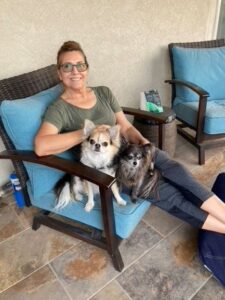



Contact Us:
sjo14@satx.rr.com
Texas Licensed Breeder
License #138
Dog and cat breeders are regulated by the
Texas Department of Licensing and Regulation
PO Box 12157
Austin, TX, 78711-2157
1-800-803-9208/512-463-6599
www.license.state.tx.us
www.tdlr.texas.gov

